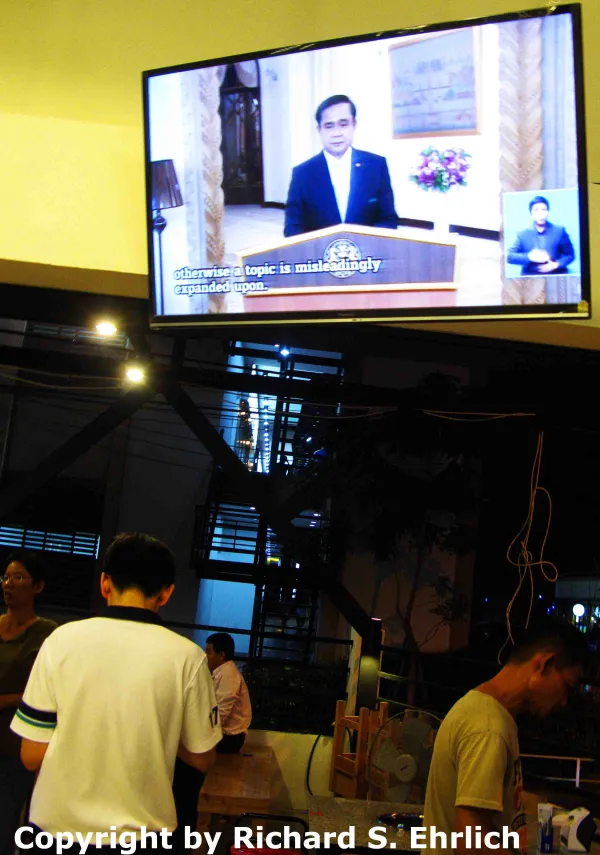BANGKOK, Thailand -- Russian Prime Minister Dmitry Medvedev's visit to
Bangkok last week resulted in trade deals, revived relations and a
public snub at Washington by Thailand's heavily criticized coup leader
who praised Moscow's friendship when "a friend is in trouble."
But on April 13, stung by published accusations that Bangkok was using
Moscow as a tool to slap Washington, coup-installed Foreign Minister
Tanasak Pantimapragorn said: "We have never befriended anyone because
we want to make other jealous"
Mr. Medvedev began his two-nation tour in Vietnam, sparking
speculation that the Kremlin was trying to "pivot" toward Southeast
Asia and mirror President Barack Obama's initiative to engage the
region, still scarred from the Vietnam War which America lost 40 years
ago.
Here in Thailand, Mr. Medvedev's April 6 to 8 visit was examined by
analysts to determine if Moscow would benefit by filling the vacuum
created when the U.S., Europe and several other countries diminished
their support for Bangkok after Gen. Prayuth Chan-ocha toppled the
elected government in a May 2014 coup.
On April 2, Gen. Prayuth's relations with the U.S. and other Western
nations deteriorated further when he seized absolute powers by
invoking his own interim constitution's Article 44, granting him full
control without any judicial, executive or legislative oversight.
When he introduced Mr. Medvedev at a joint news conference on April 8,
the moody, aggressive and unpredictable Gen. Prayuth appeared to
publicly snub Washington and other governments which disapproved of
his military junta.
"When a friend is in trouble, moral support from allies is needed.
Russia still chooses to be friends with Thailand today, and we will
ensure the bond of friendship remains tight," Gen. Prayuth said.
"Mutual interests will be shared between Thailand and Russia, and
there should be no suspicion between us," the coup leader said.
Mr. Medvedev was the first prime minister from the Kremlin to visit
Thailand in 25 years, and much of his focus was on business.
"Trade barriers or obstacles that might slow economic growth between
us will be removed," Mr. Medvedev said at the news conference.
"Our friends from the Western part of the world are ignoring
Thailand," Russian Trade Minister Denis Manturov told Reuters in
Bangkok on April 8.
"We are feeling out the interest on the Thai side to purchase military
equipment," Mr. Manturov said.
"Russia also launched talks on unspecified arms sales to Thailand,
which hope to find a favorable market after the West pulled back from
the country following a recent military coup in May last year," Moscow
Times reported on April 9.
"The timing couldn't be better for Thailand's military junta," wrote
Saksith Saiyasombut, a respected Thai analyst.
"Since the coup, foreign criticism has been met with petulant and
indignant rebuttals by the junta -- more often than not from Gen.
Prayuth himself," Mr. Saksith said.
"The domestic authoritarianism during the coup period reinforces
Thailand's turn towards external authoritarian regimes that would do
business with Bangkok's military-led government," wrote Thitinan
Pongsudhirak, director of the Institute of Security and International
Studies at Bangkok's royalist Chulalongkorn University.
"While Bangkok is bereft of a democratically legitimate government
based on popular sovereignty, Thailand's internal authoritarian rule
and regime interest and pursuit of receptive and accommodating
authoritarian regimes abroad will become more entrenched," Mr.
Thitinan said on April 10.
Others were less certain about any supposed benefit gained by Moscow
in response to America's criticism of the coup.
An anti-coup Twitter commentator, JQ Public, posted on April 13: "Same
argument abt 'China filling the vacuum' was made [and] abt Soviet
Union every time US didn't bck some new tyrant somewhere."
Moscow and Bangkok share only $5 billion in trade -- mostly Russian
exports to Thailand -- but hope to double that next year.
During Medvedev's visit, "state rail monopoly Russian Railways signed
a memorandum with Thai mining and power company Banpu on an
infrastructure project in Indonesia, while Moscow promised to buy at
least 80,000 tons of Thai rubber for use the defense industry," Moscow
Times reported.
But the two countries did not sign an expected free trade agreement.
"It was announced less than half a year ago that everything was in
order, that they would sign [the free trade agreement] in January, and
still nothing's come of it," said Vladimir Mazirin, director of the
Vietnam and ASEAN center at the Russian Academy of Sciences, according
to Moscow Times.
Moscow-based JSC United Aircraft Corp. showcased a Sukhoi Superjet 100
RJ on the tarmac at one of Bangkok's international airports, in a
sales campaign during the Russian prime minister's visit.
Bangkok does not own any of the 100-seat, twin-engine SJ100 jets.
The foundation of relations between Bangkok and Moscow date back to
1897 when King Chulalongkorn met Tsar Nicholas II in Moscow.
In the 20th century, during the U.S.-Soviet Cold War, Bangkok sided
with Washington against Moscow's communists.
In 2010, Bangkok displeased Moscow by extraditing Russian arms dealer
Viktor Bout to New York where the so-called "Merchant of Death" was
convicted and imprisoned, despite efforts by the Kremlin to convince
Thailand to release Mr. Bout.
"It is deeply regrettable that the Thai authorities have yielded to
political pressure from outside and carried out this illegal
extradition of Viktor Bout," Russia's Foreign Ministry said at the
time.
***
Richard S. Ehrlich is a Bangkok-based journalist from San Francisco,
California, reporting news from Asia since 1978.



